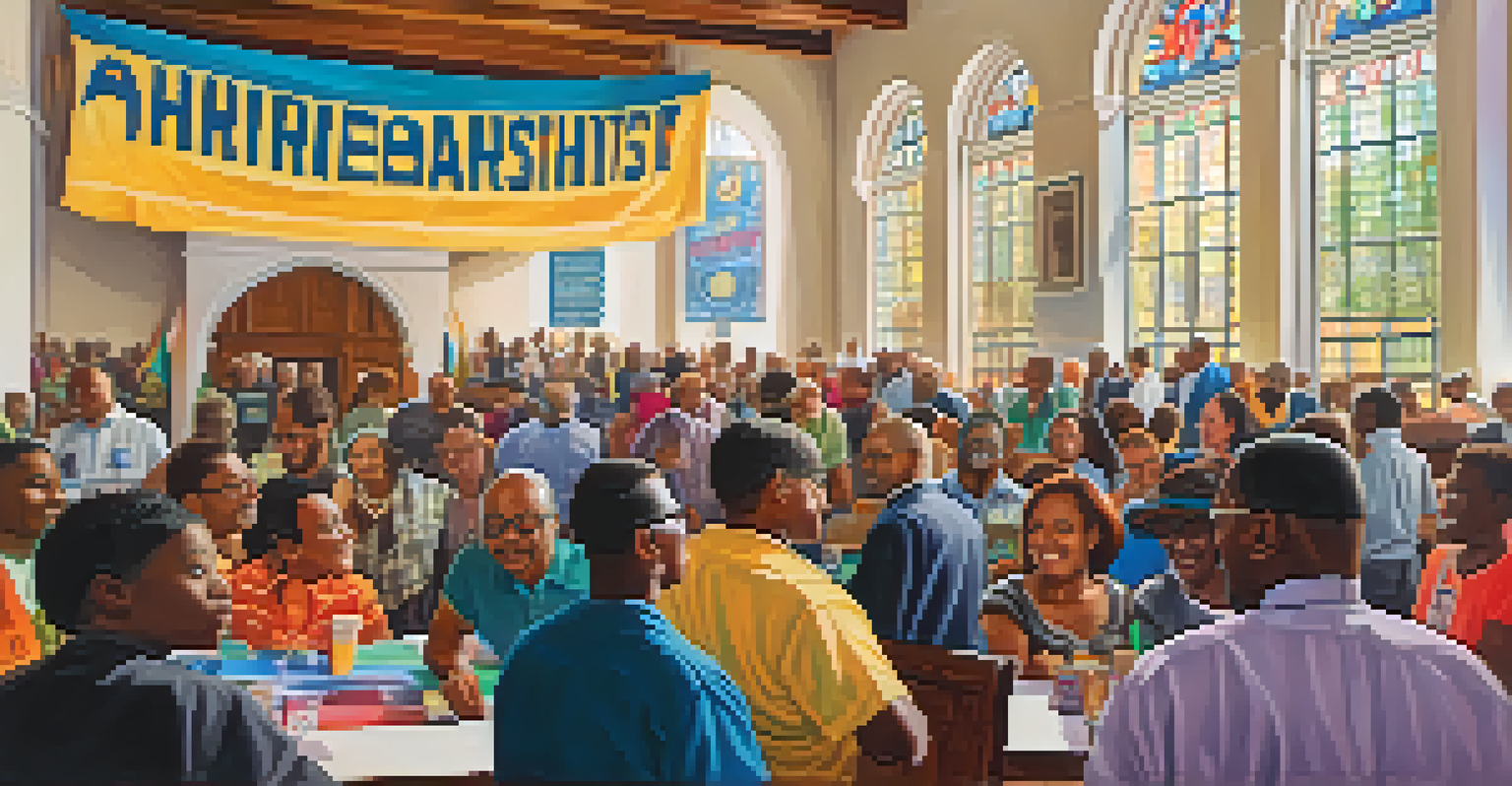The Historic Ebenezer Baptist Church and Its Legacy

The Origins of Ebenezer Baptist Church in Atlanta
Ebenezer Baptist Church, founded in 1886, has deep roots in Atlanta's community. It began as a small congregation, gathering in homes and schools, driven by a mission to serve both spiritual and social needs. Over the years, it grew in size and influence, becoming a beacon of hope and resilience for local residents.
Injustice anywhere is a threat to justice everywhere.
The church’s founding members were determined to create a place of worship that reflected their values and aspirations. They sought to provide not just religious guidance but also education and support amidst the challenges faced by African Americans in the post-Reconstruction era. This vision laid the groundwork for what would become a significant institution in the civil rights movement.
As the church expanded, it adopted a more formal structure, ultimately settling into its current location in 1922. This transition marked a pivotal moment in its history, allowing it to accommodate a larger congregation and engage more actively with the community.
Martin Luther King Jr.'s Connection to Ebenezer Baptist Church
One of the most notable figures associated with Ebenezer Baptist Church is Dr. Martin Luther King Jr., who was both baptized and later ordained there. His father, Martin Luther King Sr., was the church's pastor and played a crucial role in shaping King's early life and beliefs. This familial connection helped lay the foundation for King's future as a civil rights leader.

King’s time at Ebenezer was instrumental in developing his vision of social justice and equality. The church provided him with a platform to voice his concerns and inspire others. Through sermons that emphasized love and nonviolence, he rallied the congregation to take action against racial injustice.
Historical Roots of Ebenezer Church
Ebenezer Baptist Church, founded in 1886, has played a vital role in Atlanta's community by addressing both spiritual and social needs.
As King rose to prominence, Ebenezer Baptist Church became a central hub for the civil rights movement. It hosted meetings and events that galvanized the community, showcasing the church's pivotal role in advocating for change during this tumultuous period in American history.
The Role of Ebenezer in the Civil Rights Movement
Ebenezer Baptist Church served as a critical meeting place for civil rights leaders and activists during the 1950s and 1960s. It was a sanctuary where individuals could come together to strategize and organize peaceful protests against racial segregation and inequality. The church’s mission extended beyond spiritual nourishment; it became a catalyst for social change.
Faith is taking the first step even when you don't see the whole staircase.
Events such as the Southern Christian Leadership Conference (SCLC) meetings were held at Ebenezer, further solidifying its importance in the movement. The church provided a safe space for discussions on key issues, enabling leaders to formulate plans that would ultimately lead to significant milestones, such as the March on Washington.
Through its unwavering commitment to justice, Ebenezer helped to mobilize the African American community in Atlanta and across the nation. The collective efforts of its congregation and leaders demonstrated the power of faith-driven activism in the fight for civil rights.
Architectural Significance of the Church Building
The architectural design of Ebenezer Baptist Church reflects its historical and cultural significance. The church features a striking Neo-Gothic style, characterized by pointed arches, detailed brickwork, and large stained glass windows. These elements not only contribute to its aesthetic appeal but also symbolize the strength and resilience of the congregation.
In 1999, the church underwent a significant renovation to enhance its facilities while preserving its historical integrity. This project included the addition of a new sanctuary that can accommodate larger gatherings, allowing the church to continue its mission of outreach and education.
King's Influence on Civil Rights
Dr. Martin Luther King Jr.'s connection to Ebenezer Baptist Church was pivotal in shaping his vision and activism during the civil rights movement.
Ebenezer's architecture is a testament to its enduring legacy, showcasing how a place of worship can also serve as a landmark of social justice. Visitors are often struck by the beauty of the building and its powerful history, making it a vital part of Atlanta's cultural landscape.
Community Outreach and Social Services at Ebenezer
Beyond its spiritual role, Ebenezer Baptist Church is deeply committed to community outreach and social services. The church runs various programs aimed at addressing the needs of the local population, including food banks, educational initiatives, and health services. This holistic approach reflects the church’s mission to uplift and empower individuals.
One notable initiative is the church’s partnership with local organizations to provide resources for families in need. These efforts include job training programs and financial literacy workshops, helping individuals gain the skills necessary for economic stability. Such outreach exemplifies the church's dedication to social justice and community well-being.
Through these programs, Ebenezer continues to honor its legacy while adapting to the evolving needs of its community. The church acts as a vital resource, fostering a spirit of collaboration and support that resonates with its members and the wider Atlanta community.
Ebenezer's Influence on Modern Activism
Today, Ebenezer Baptist Church remains a powerful symbol of activism and social change. It serves as a reminder of the sacrifices made during the civil rights movement and encourages new generations to carry on the fight for equality. The church regularly hosts events and discussions that focus on contemporary issues, urging members to engage in activism.
The legacy of Dr. King continues to inspire countless individuals who walk through its doors. Many young activists cite the church as a source of motivation, drawing on its rich history to inform their own efforts for justice. This connection to the past empowers them to confront modern challenges with determination and purpose.
Ongoing Community Engagement
Today, Ebenezer Baptist Church continues its legacy by providing outreach programs and social services that uplift and empower the local community.
Ebenezer’s ongoing commitment to social equity reinforces the idea that activism is not just a historical phenomenon but a continuous journey. The church stands as a testament to the belief that collective action can lead to meaningful change, encouraging everyone to play a role in shaping a just society.
Visiting Ebenezer Baptist Church: A Living Legacy
Visiting Ebenezer Baptist Church offers a unique opportunity to connect with history and witness its living legacy. The church welcomes visitors from around the world, providing guided tours that delve into its rich past and ongoing impact. These experiences allow guests to appreciate the significance of this sacred space in both religious and historical contexts.
During your visit, you can explore exhibits that highlight key moments in the church's history, including its role in the civil rights movement. Engaging with knowledgeable guides and participating in services or community events provides a deeper understanding of how the church continues to serve its congregation and the wider community.

Ebenezer Baptist Church is not just a place of worship; it is a place of learning, reflection, and empowerment. Whether you’re drawn by its architectural beauty or its historical importance, a visit to Ebenezer is a chance to honor the past while looking toward a future of hope and justice.